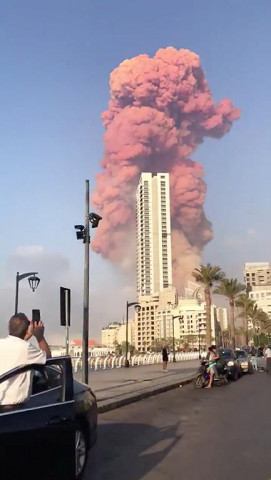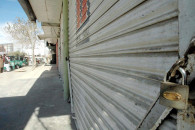Karachi Commissioner seeks info about ammonium nitrate stocks after Beirut blast
Move comes in wake of massive blasts in Beirut, killing over 150 people and leaving thousands wounded

Karachi Commissioner Iftikhar Shallwani has issued directives to the deputy commissioners (DC) and trade association leaders, seeking details about the stocks of ammonium nitrate in the metropolis in the wake of the explosions in Beirut, Lebanon, that killed over 150 people, wounded thousands and left over 300,000 people homeless.
In a letter on Saturday, Shallwani directed all DCs in the city and the chairpersons of the Korangi, Landhi, Federal B Area, SITE, North Karachi and Bin Qasim associations of trade and industry to submit details of the storage of ammonium nitrate and other dangerous dual-use precursor chemicals in Karachi’s port areas and industrial zones at the earliest.
The DCs have been asked to inform the commissioner’s office about the name of the company or factory possessing the chemicals, names of their owners, quantity and nature of the chemicals, the duration of storage and safety measures taken to avoid any untoward incidents.
What is ammonium nitrate and why is it dangerous?
On August 4, two explosions occurred at the Beirut port, with the powerful second blast sending massive shockwaves through the Lebanese city. The latter blast has been attributed to the improper storage of approximately 2,750 tonnes of ammonium nitrate at a port warehouse. The chemicals, which can be highly explosive, had been confiscated from the MV Rhosus ship in 2014.
Ammonium nitrate is an industrial chemical commonly used in fertilisers and as an explosive for quarrying and mining. It is an oxidiser considered relatively safe if uncontaminated and stored properly. But it is extremely dangerous if contaminated, mixed with fuel or stored unsafely.
A large quantity of ammonium nitrate exposed to intense heat can trigger an explosion. Storing the chemical near large fuel tanks, in bulk in large quantities and in a poorly-ventilated facility could cause a massive blast. The larger the quantity, the more risk it will detonate.
With input from Reuters



















COMMENTS
Comments are moderated and generally will be posted if they are on-topic and not abusive.
For more information, please see our Comments FAQ